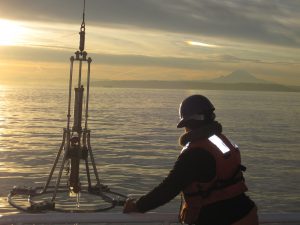Along with individual stressor-based research projects, NCCOS undertakes a broader ecosystem approach using larger, multidisciplinary research projects. A recent essay, authored in part by NCCOS-sponsored scientists, gives perspectives on challenges and paths for advancing estuarine science; NCCOS research strives to meet these challenges.

Five major research challenges were identified: (1) Maintaining and improving spatially distributed time-series data sets; (2) maximizing innovation by harnessing new technologies, (3) resuscitating experimental ecosystem research for estuaries, (4) integrating diagnostic ecological models and (5), improving basic science by linking it to applied research.
- Time-series data collection: NCCOS long-term monitoring includes ongoing decadal time series for northern Gulf of Mexico hypoxia and national contaminant trends via the National Status and Trends (NS&T) program.
- Harnessing new technologies: NCCOS is a leader in more accurate forecasts and faster, easier ways to identify, and measure hypoxic dead zones, pathogens, and blooms of harmful algae and their toxins.
- Experimental ecosystem-scale research: NCCOS regional ecosystem research focuses on predicting impacts of regional shoreline hardening on mid-Atlantic estuaries, bio-economic impacts of invasive species across the Great Lakes region, and population connectivity between coral reefs in the Gulf of Mexico and the Florida Keys. Ocean acidification on regional scales is also a focus of NCCOS research.
- Integrating ecological models into ecosystem research: NCCOS research explores how ecosystem scenario models can be made more useful for management and policy decisions.
- Improving basic science by linking it to applied research: A tenet of NCCOS is that its sponsored research support more informed decision-making, has real-world applications, and has outcomes that are disseminated to the management community. In many cases, these outcomes are predictive tools that form the scientific underpinnings of an ecosystem approach to management.
Examples of future estuarine research questions are also highlighted, including responses to climate change and related external stresses such as sea level rise, drought or increased rainfall, nutrients, contaminants, seasonality shifts, and fluctuations in carbon dioxide release and capture. Many of these future research questions will be studied by NCCOS.
For more information, contact Elizabeth.Turner@noaa.gov.
